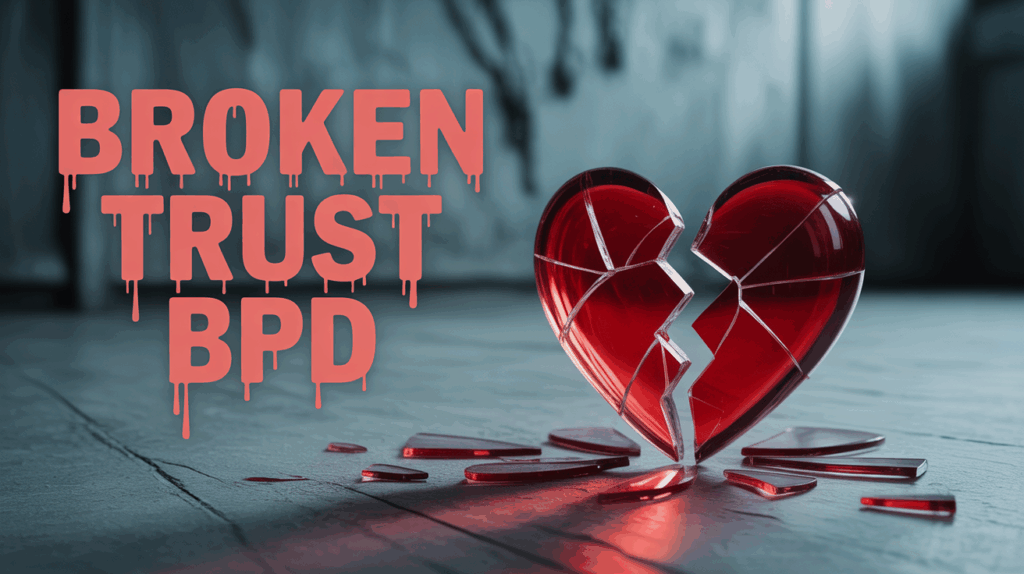BPD and Cheating
What Is BPD?
Borderline personality disorder (BPD) is a mental health condition that affects the way a person thinks, feels, and behaves in relationships. It is a personality disorder marked by emotional dysregulation, unstable moods, and intense fears of abandonment. People with BPD may experience rapid shifts in emotion, difficulty managing stress, and impulsivity that disrupts their daily lives.

Psychology and psychiatry research show that BPD often develops from a mix of genetic, environmental, and early life factors such as neglect or abuse. The condition can create challenges with self-image, empathy, and coping, which often spill into personal connections. This makes relationships one of the most difficult areas for people living with BPD.
Understanding BPD and Infidelity
Borderline personality disorder (BPD) is a mental health condition that deeply impacts relationships. Many people search for answers about why BPD and cheating often appear linked. While not every person with BPD is unfaithful, certain traits like impulsivity, emotional dysregulation, and fear of abandonment can increase the risk of infidelity.
In psychology, infidelity is understood as more than physical intimacy outside a relationship. It can include emotional connections, deception, or secrecy that erodes trust. For someone with a personality disorder like BPD, relationships can feel unstable, and this instability may contribute to cheating behaviors.
The Role of Impulsivity and Emotion
Impulsivity is one of the hallmark traits of borderline personality disorder. This impulsive behavior may lead to risky decisions such as promiscuity, hypersexuality, or sudden breakups. The mind can shift quickly under stress, making faithful commitment feel difficult in the moment.
Strong emotion is another factor. Intense mood swings, anger, anxiety, and panic can drive decisions that feel overwhelming. Cheating may occur as a short-term coping strategy, even when guilt and shame follow afterward.
Remorse and Guilt After Cheating
While someone with BPD may cheat, they often experience deep remorse afterward. The cycle of guilt, shame, and emotional dysregulation can intensify suffering. This can push the person to feel neglected or abandoned again, repeating the cycle.
Fear of Abandonment and Relationship Instability
A central challenge in borderline personality disorder is the intense fear of abandonment. This fear may lead to manipulation, gaslighting, or attempts to control a partner. In some cases, cheating may occur as a way to test loyalty or reduce anxiety about being left. For more information, you can read about DBT therapy for borderline personality disorder.
The paradox is that cheating itself creates instability in the marriage or relationship. This often results in more stress, anger, and eventual breakup, even if empathy and love were present at the start.
Gender and Cheating in BPD
Research in psychiatry and psychology shows both men and women with BPD may engage in infidelity. Gender does not determine the behavior but can shape how it is expressed. Men with BPD may show impulsivity through hypersexuality or alcohol abuse, while women may more oftenly express it through emotional affairs or manipulation.
Other Relationship Issues Linked to BPD
Cheating is not the only problem that can arise in relationships with borderline personality disorder. Constant mood swings, paranoia, and emotional dysregulation may create frequent conflict. Partners may feel as though they are walking on eggshells, unsure of how the person with BPD will react.
Emotional neglect and manipulation may also surface. Gaslighting, guilt-tripping, or sudden withdrawal can harm the bond in a marriage. Even when cheating is not present, the instability and fear of abandonment can create long-term stress for both partners.

Cheating, Abuse, and Emotional Harm
Cheating in the context of BPD is not just about physical acts. It can involve deception, gaslighting, and emotional abuse that damage trust. When combined with other factors like narcissism or traits of narcissistic personality disorder, the harm to a partner can be severe.
Some individuals with BPD may also display paranoia or psychopathy-like behaviors, though this is not always the case. These traits increase the likelihood of neglect, emotional instability, and abuse within the relationship.
Promiscuity and Hypersexuality
Promiscuity and hypersexuality are common in BPD when stress and emotional pain feel unbearable. This behavior can temporarily numb feelings of abandonment or fear. However, it often leads to guilt, shame, and further conflict.
The Impact on Partners
Partners of someone with BPD who cheats often struggle with trust and mental health. They may feel manipulation, fear, and gaslighting during conflicts. Some turn to couples therapy to rebuild the relationship, while others find the stress leads to a breakup or divorce.
Empathy for both partners is important. The person with BPD may be suffering from intense emotional dysregulation, while the partner may experience neglect, abuse, or betrayal. Therapy with a mental health professional can help both understand the cycle of behavior.
Anger, Guilt, and Emotional Cycles
After cheating, anger and guilt often surface. The person with BPD may direct anger outward, blaming the partner for neglect or abandonment. Then they may experience guilt and shame, leading to self-destructive thoughts, substance abuse, or reckless behavior.
This cycle affects the mental health of both people. Anxiety, depression, and even bipolar disorder may overlap with BPD, adding to the instability in the relationship.
Therapy for BPD and Cheating
Treatment for borderline personality disorder can make a significant difference. Dialectical behavior therapy (DBT) is one of the most effective therapies for BPD. It focuses on coping skills, emotion regulation, and reducing impulsivity that can lead to cheating.
Couples therapy can also provide a safe space to discuss infidelity and work through the damage it causes. With the guidance of a mental health professional, both partners can learn healthier ways to cope with stress, guilt, and anger.
Role of Psychiatry and Medication
While therapy is the cornerstone of BPD treatment, psychiatry can also help. Medications may be used to treat mood swings, anxiety, or co-occurring conditions such as bipolar disorder or major depressive episodes. Psychiatry provides a more structured approach to help stabilize the mind.
Coping Strategies for Partners
Partners of someone with BPD who has cheated need coping strategies to protect their own mental health. This may involve setting boundaries, seeking individual therapy, or attending support groups.
Learning about the psychology of BPD can help partners understand why infidelity occurred. While this does not excuse abuse or deception, it allows space for empathy and realistic decision-making about whether to stay in the marriage or move on.
Alcohol, Stress, and Risky Behavior
Alcohol and substance abuse can increase impulsivity and the likelihood of cheating. People with BPD may turn to alcohol to manage stress or panic, but this often worsens emotional dysregulation. Partners may notice mood changes, neglect, or manipulation tied to substance use.
Coping without substances, such as using mindfulness or therapy-based strategies, can reduce risk and support healthier behavior.

Connection Between BPD and Other Disorders
Cheating in BPD often overlaps with symptoms of other disorders. Traits of narcissistic personality disorder, such as lack of empathy or manipulation, can intensify infidelity. In other cases, paranoia, psychopathy-like behavior, or depression may contribute to emotional neglect.
Bipolar disorder may also complicate matters, with mood shifts increasing impulsivity. The mix of BPD with other mental health conditions makes treatment essential for long-term stability.
The Difference Between BPD and Bipolar Disorder
Though borderline personality disorder and bipolar disorder are sometimes confused, they are different mental health conditions. BPD centers on fear of abandonment, impulsivity, and unstable relationships. Bipolar disorder is primarily a mood disorder with cycles of depression and mania or hypomania.
Someone with BPD may shift moods within hours, often triggered by stress or rejection. In contrast, bipolar mood changes last days, weeks, or even months, and are not always tied to relationship dynamics. Both conditions can co-occur, which may make infidelity and emotional regulation even more difficult.
Shame and Remorse After Infidelity
Even when someone with BPD cheats, they may feel shame, remorse, and deep guilt afterward. This inner conflict creates a painful cycle in the mind. Therapy helps break the cycle by teaching healthier ways to manage abandonment fears and intense emotion.
Rebuilding Trust in Relationships
Rebuilding trust after infidelity linked to BPD is possible but challenging. Both partners must commit to therapy, honest communication, and clear boundaries. Couples therapy helps address manipulation, gaslighting, and abuse, creating a foundation for healing.
Some marriages survive infidelity when therapy and empathy are consistent. In other cases, a breakup or divorce may be the healthiest choice for both partners’ mental health.
The Role of Revival Mental Health
At Revival Mental Health in Orange County, our treatment center provides support for people with borderline personality disorder and their families. We offer dialectical behavior therapy, couples therapy, and individualized treatment programs to help reduce impulsivity, manage stress, and heal from the pain of infidelity.
Our clinicians understand the emotional cycles of BPD and cheating. With professional guidance, recovery and healthier relationships are possible.
Conclusion
Borderline personality disorder creates unique challenges in relationships, and cheating is one of the most painful outcomes. Impulsivity, fear of abandonment, and emotional dysregulation often drive decisions that lead to infidelity, guilt, and instability. These behaviors affect both partners, leading to cycles of anger, stress, and potential breakup.
With the right support, however, these cycles do not have to continue. Therapy, psychiatry, and couples counseling provide ways to address impulsivity, rebuild trust, and restore mental health. By working with a mental health professional and focusing on healing, it is possible for individuals with BPD and their partners to move toward healthier, more stable connections.
FAQs
1. Can BPD cause hypersexuality without cheating? Yes, hypersexuality can occur in borderline personality disorder without actual cheating. It may involve intense sexual thoughts or impulsive desires that add stress to relationships.
2. Do all people with BPD struggle with infidelity? No, not everyone with BPD cheats. Many maintain faithful marriages by managing impulsivity, attending therapy, and working with a mental health professional.
3. How can partners protect their mental health when dealing with BPD infidelity? Partners can protect their health by setting boundaries, attending therapy, and seeking support groups. This helps reduce stress and improves coping.
4. Is infidelity in BPD linked to psychopathy or narcissism? Not always. While some traits of narcissistic personality disorder or psychopathy overlap, infidelity in BPD is more often linked to impulsivity, abandonment fears, and emotional dysregulation.





